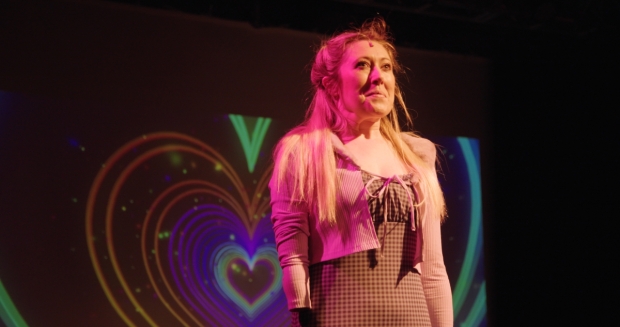Snatched at Soho Theatre – review

© Meurig Marshall
Hot on the heels of Fleabag, Phoebe Waller Bridge's career-launching mega hit, which played at the Soho Theatre long before its big break on the BBC, Snatched is an equally bold and exposing new one-woman show written by and starring Melissa Johns which is playing at the same venue ahead of a UK tour.
Johns, who as well as being known for Coronation Street recently appeared in Henry V at the Donmar Warehouse, sheds all trace of character with a deeply personal and honest performance. Ostensibly about her emotional response to the leaking of her nude photographs in 2018, the autobiographical show ventures back to Johns' 1990s childhood and her experience growing up with a disability.
Johns was born with only one forearm, and while this characteristic has of course not deterred her from success (acting as it turns out is not a job that requires both hands), we come to learn that she has had to fatiguingly explain and announce to new romantic partners throughout her life that she only has one arm – "or one and a half if you're a glass half full type of person".
Though many in the audience may already know of the plot twists which await, Johns does well to endear herself with an easy likability and charm before dropping the inevitable bomb. That she performs with such genuine humanity is key to the show's success. Equally clever is the choice to pepper the script with 90s nostalgia – a soundtrack of school disco hits elevates the tragedy, euphoria and awkward comedy of each recollection as we journey through Melissa's adolescence. These atmospherically arranged songs are performed live, with vocals and instrumental accompaniment provided by Imogen Halsey and pair perfectly with the rich script.
In particular, the pathos-filled arrangement of the Vengaboys' "Boom, Boom, Boom, Boom" is so stirring it could be a wedding march, while a cello performance of "Macarena" cleverly asserts its emotional intensity as Johns hides in a prom night bathroom, ostracised from the dancefloor by the inaccessible armography. Perhaps the most powerful, however, is the deployment of Roy Orbison's "Pretty Woman" as real, increasingly hard to stomach comments from Johns' nude photographs are projected against a sickly pink background while Johns plasters on a loaded, dissociative stare.
Structurally, the show is mostly linear, though this is occasionally abandoned in favour of side-stepping into a memory that can better serve the emotional tone of that moment. Each scene is brief, and the show sometimes begins to take on a sketch comedy feel, further bolstered by Johns' eye-twinkling sense of humour. The narrative as shaped by Johns and director/co-devisor Lily Levin is inherently uplifting and though there are devastating emotional pitfalls aplenty, it can't resist diffusing each new moment of tension, carefully nurturing the audience's sinking hearts with a self-deprecating quip or witty observation to accompany each woeful revelation.
In one recurring segment, Johns plays an increasingly insensitive (and pointedly named) breakfast television presenter highlighting disablism in media dialogue without too deeply interrogating it. At the show's opening is an extended sequence in which Johns presents and subsequently accepts a laughably over-indulgent award for human excellence. Coupled with a perhaps slightly disjointed feel between sections, the piece can feel structurally shallow but lacks nothing in emotional sincerity.
As we begin to approach the more turbulent events of Johns' adult years, it is surprising when the action moves on almost as quickly and they feel unexpectedly reduced to but a single chapter of a larger story (which, I suppose, they are) rather than the focus of the show. There is some brilliant earlier material in which Johns, as her younger self, grapples with her sexuality in the face of her disability with characteristic humour and there is perhaps more that could be done to allow this to foreshadow later events in the play.
And yet, Johns has the kind of effortless presence and warmth that could make any script sing – hers is the kind of revealing performance here that makes you alternately want to hug her or buy her an enormous drink. Additionally, while this show no doubt speaks in a profoundly personal way to disabled theatregoers (and it was lovely to see so many deeply engaged by it and well provided for by the Soho Theatre at last night's press night), the emotional takeaway is far more relatable than simply for those missing a forearm, and speaks to anyone who has ever been made to feel othered or like an outsider in terms of their physical appearance or identity. Less a recap of a trashy tabloid tornado and more a profoundly personal portrait of a person coming to terms with body dysmorphia, a significant future life for this show feels inevitable.










